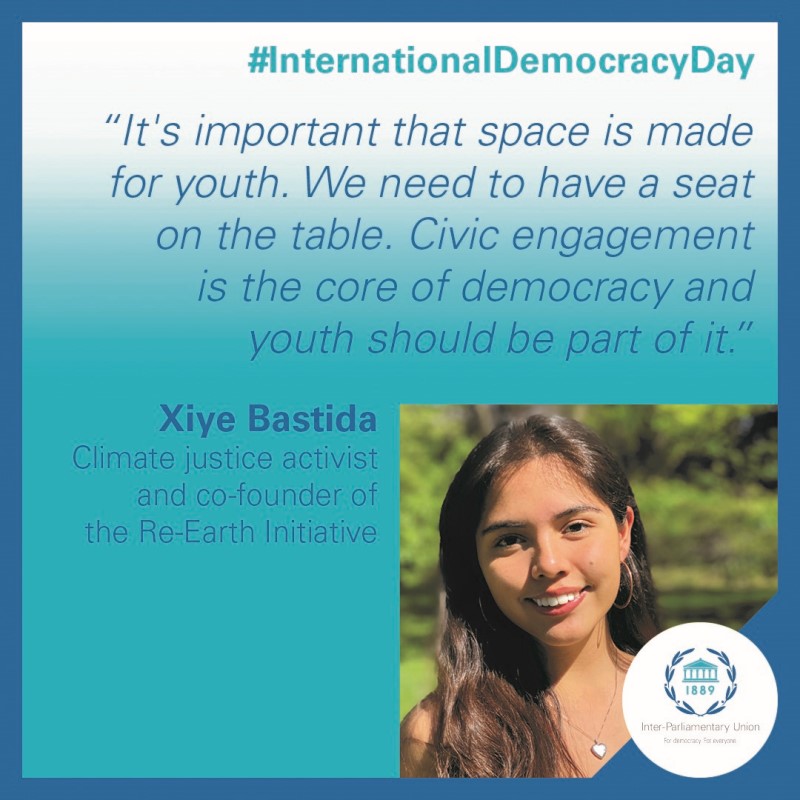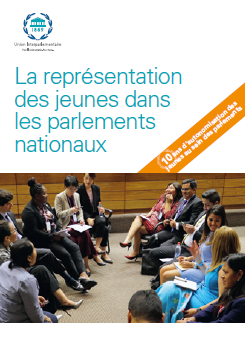Objectif 6 2020
Autonomisation des jeunes
2020 a marqué le dixième anniversaire de la résolution de l’UIP de 2010 sur la participation des jeunes au processus démocratique. Pour qu’il y ait démocratie il faut que les parlements soient représentatifs de l’ensemble des citoyens et les jeunes constituent le groupe de population le plus concerné par les enjeux de l’avenir des pays. Avec la pandémie de COVID-19, la vulnérabilité des jeunes a encore été exacerbée, en particulier dans les domaines de l’emploi, de l’éducation et de la santé. Malgré cet état de fait, la plupart des parlements comptent un trop petit nombre de jeunes parlementaires. Depuis 2010, l’UIP recueille des données sur la représentation des jeunes, en particulier des jeunes femmes, et s’efforce de susciter une prise de conscience de cette question et de promouvoir une plus large participation des jeunes.
Accroître la participation et le leadership politiques des jeunes femmes
Au moment où le monde célébrait le 25e anniversaire de la Déclaration de Beijing pour l’égalité des sexes, l’UIP a insufflé une énergie nouvelle pour redoubler d’efforts en faveur de la participation des jeunes femmes à la politique. En collaboration avec le Bureau de l’Envoyé du Secrétaire général de l’ONU pour la jeunesse, l’UI P a réuni des responsables politiques et de jeunes femmes, avec le concours de mouvements des jeunes et des femmes, d’organisations internationales, d’organismes de l’ONU et d’universités. Pendant cette réunion, il a été question des obstacles à la participation politique des jeunes femmes et des moyens de les supprimer.
P a réuni des responsables politiques et de jeunes femmes, avec le concours de mouvements des jeunes et des femmes, d’organisations internationales, d’organismes de l’ONU et d’universités. Pendant cette réunion, il a été question des obstacles à la participation politique des jeunes femmes et des moyens de les supprimer.
L’appel à l’action qui en est issu met l’accent sur les actes de sexisme, de harcèlement, d’intimidation et de violence ainsi que sur les problèmes de financement et le manque de solidarité intergénérationnel qui empêchent les jeunes femmes d’accéder à un mandat public. Les solutions envisagées englobent des financements pour aider les jeunes femmes à entrer en politique, le recrutement de jeunes femmes en plus grand nombre à des postes de direction de la fonction publique, et la mise en place de quotas. Parlements et partis politiques doivent être sensibles à la question du genre et exempts d’actes de violence, de harcèlement sexuel et d’intimidation.

Donner aux jeunes une plus large part dans les débats internationaux
En 2020, on a constaté une augmentation de la participation de j eunes parlementaires aux réunions internationales de l’UIP pour promouvoir des résultats intégrant le point de vue des jeunes. Quelque 25 jeunes présidents de parlement ont participé à la Conférence des présidents et 121 jeunes parlementaires ont assisté au Conseil directeur en ligne. Par ailleurs, les membres du Conseil du Forum des jeunes parlementaires de l’UIP ont souligné la nécessité que davantage de jeunes s’engagent en politique et qu’après la crise de la COVID-19, la reprise se fasse au profit d’une « reconstruction en mieux ». C’est un message qu’ils ont relayé à de multiples conférences internationales, notamment celles organisées par l’ONU, la Communauté des démocraties, l’organisation des lauréats et des dirigeants en faveur des enfants (fondée par Kailash Satyarthi, lauréat du prix Nobel), etc.
eunes parlementaires aux réunions internationales de l’UIP pour promouvoir des résultats intégrant le point de vue des jeunes. Quelque 25 jeunes présidents de parlement ont participé à la Conférence des présidents et 121 jeunes parlementaires ont assisté au Conseil directeur en ligne. Par ailleurs, les membres du Conseil du Forum des jeunes parlementaires de l’UIP ont souligné la nécessité que davantage de jeunes s’engagent en politique et qu’après la crise de la COVID-19, la reprise se fasse au profit d’une « reconstruction en mieux ». C’est un message qu’ils ont relayé à de multiples conférences internationales, notamment celles organisées par l’ONU, la Communauté des démocraties, l’organisation des lauréats et des dirigeants en faveur des enfants (fondée par Kailash Satyarthi, lauréat du prix Nobel), etc.
À Djibouti, l’UIP a apporté son soutien aux jeunes parlementaires élus aux élections de 2018. L’atelier de deux jours organisé à leur intention a été suivi par 70 pour cent des jeunes parlementaires de l’Assemblée nationale. Il portait sur le développement des compétences en matière de leadership et de communication et sur les méthodes à utiliser pour mieux faire valoir le point de vue des jeunes dans les travaux parlementaires. Les jeunes parlementaires, qui ont ainsi renforcé leurs compétences, ont aussi élaboré une feuille de route pour continuer à accroître leurs capacités et établir des relations plus étroites avec la jeunesse de leur pays. Cette feuille de route prévoit en particulier de consolider le réseau des jeunes parlementaires au sein du parlement et de susciter une plus grande prise de conscience des problèmes de la jeunesse.
Étude de cas
La jeunesse nigériane avance doucement mais sûrement
Avec l’appui de l’UIP, le pays le plus peuplé du continent africain, le Nigéria, ouvre sa sphère politique aux jeunes. En 2020, une conférence en ligne de haut niveau a été organisée par l’UIP sur le renforcement de la participation des femmes et des jeunes. Les participants se sont engagés à voter des amendements constitutionnels et de nouveaux textes législatifs afin d’accroître la représentation des jeunes à l’Assemblée nationale et au niveau local. Des révisions constitutionnelles sont prévues en 2021.
En 2018, le Nigéria avait déjà abaissé l’âge de l’éligibilité à un mandat électif. La conférence de 2020 s’inscrivait dans le cadre d’un projet en cours d’assistance de l’UIP à ce pays et faisait suite à des conférences similaires tenues en 2017 et 2018.
L’impact de l’UIP
10 ans d’autonomisation des jeunes dans les parlements et grâce à leur action
Ce dixième anniversaire qui fournit une excellente occasion de faire le bilan des accomplissements, est aussi le moment de s’engager à poursuivre l’action. Des avancées significatives ont été accomplies par les Membres de l’UIP, depuis la mise en place de quotas de jeunes jusqu’à l’abaissement de l’âge de l’éligibilité à un mandat électif, en passant par la création de nouvelles structures parlementaires pour autonomiser les jeunes. Dans le cadre des célébrations organisées à l’occasion de ce 10e anniversaire, les parlements ont rendu compte de leur mise en oeuvre de la résolution de 2010 sur les jeunes.
Quelques exemples sont donnés ci-dessous :
• En Norvège, le président du parlement rencontre régulièrement des jeunes. Une collaboration avec des organisations à but non lucratif a débouché sur la publication d’un guide incitant les jeunes à prendre part aux débats sociaux.
• Les parlements de Malte, de la Malaisie et de la Gambie ont abaissé l’âge du droit de vote aux élections législatives, qui est désormais de 16 ans à Malte et de 18 ans en Malaisie et en Gambie.
• Le Congrès de Micronésie a encouragé la participation de jeunes aux délégations nationales envoyées à des réunions internationales. Son programme prévoit en outre de prioriser et d’intensifier les possibilités d’emploi pour les jeunes défavorisés d’un point de vue social ou économique.
• En El Salvador, un premier Groupe des jeunes parlementaires a été créé. Il rassemblera des parlementaires de 25 à 35 ans.
• Au Mexique, la Chambre des députés a voté des mesures pour améliorer la représentation des jeunes au parlement et a créé une Commission des jeunes qui organise régulièrement des auditions parlementaires et des consultations auprès des jeunes.
Lors de la cinquième Conférence mondiale des présidents de parlement, les participants se sont à nouveau engagés à favoriser l’autonomisation des jeunes et se sont accordés sur une série de recommandations visant à accroître la participation des jeunes en politique et leur représentation dans les parlements. L’UIP est prête pour une nouvelle décennie d’action.